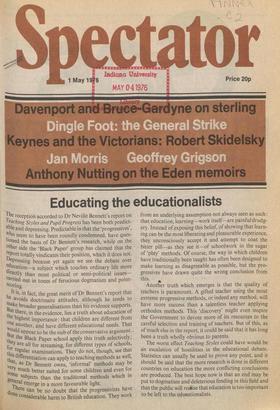Educating the educationalists
The reception accorded to Dr Neville Bennett's report on Teaching Styles and Pupil Progress has been both predictable and depressing. Predictable in that the 'progressives', who seem to have been roundly condemned, have questioned the basis of Dr Bennett's research, while on the Other side the 'Black Paper' group has claimed that the rePort totally vindicates their position, which it does not. Depressing because yet again we see the debate over ed. ucation—a subject which touches ordinary life more directly than most political or semi-political issues— carried out in tones of ferocious dogmatism and pointscoring. It is, in fact, the great merit of Dr Bennett's report that he avoids doctrinaire attitudes, although he tends to make broader generalisations than his evidence supports. .But there, in the evidence, lies a truth about education of the highest importance: that children are different from une another, and have different educational needs. That Would appear to be the nub of the conservative argument.. the Black Paper school apply this truth selectively; they are all for streaming, for different types of schools, Or regular examinations. They do not, though, see that his differentiation can apply to teaching methods as well, that, Dr Bennett owns, 'informal' methods may be Very much better suited for some children and even for so Me subjects than the traditional methods which in There emerge in a more favourable light. can be no doubt that the progressivists have done considerable harm to British education. They work from an underlying assumption not always seen as such : that education, learning—work itself—are painful drudgery. Instead of exposing this belief, of showing that learning can be the most liberating and pleasurable experience, they unconsciously accept it and attempt to coat the bitter pill—as they see it—of schoolwork in the sugar of 'play' methods. Of course, the way in which children have traditionally been taught has often been designed to make learning as disagreeable as possible, but the progressives have drawn quite the wrong conclusion from this. a Another truth which emerges is that the quality of teachers is paramount. A gifted teacher using the most extreme progressive methods, or indeed any method, will have more success than a talentless teacher applying orthodox methods. This 'discovery' might even inspire the Government to devote more of its resources to the careful selection and training of teachers. But of this, as of much else in the report, it could be said that it has long been a truth wholly obvious to parents.
The worst effect Teaching Styles could have would be an escalation of hostilities in the educational debate. Statistics can usually be used to prove any point, and it should be said that the more research is done in different countries on education the more conflicting conclusions are produced. The best hope now is that an end may be put to dogmatism and deleterious fending in this field and that the public will rearlise that education is too important to be left to the educationalists.


































